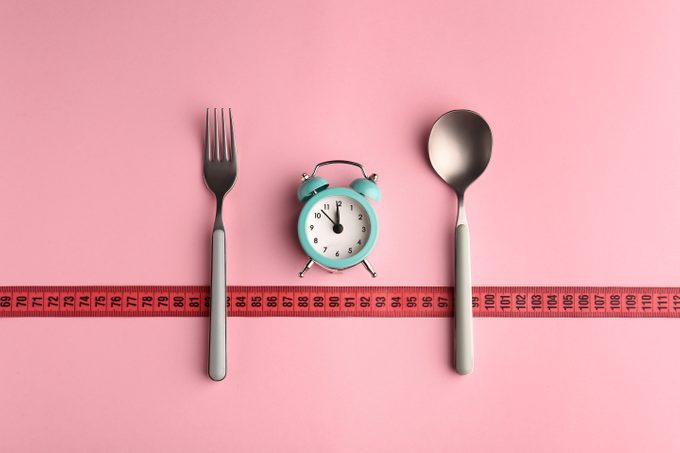How Often Should You Eat to Lose Weight?
Nutritionists' feedback on a new study may surprise you.

How often should you eat? Well, the classic “three square meals a day” rule may not be as antiquated as you think. Studies show that eating six smaller meals has led to obesity; however, what works for one person might not work for the other.
Read up on how getting to know your body can help you shed those pounds.
Make a realistic plan
These guidelines will help you determine the best weight loss practice for your body type, as noted by Dr. Dara Bushman, Psy.D., Licensed Clinical Psychologist. “Weight loss happens when a plan is realistic to someone’s lifestyle and needs. If you work 12-hour shifts, it is not realistic to eat every two hours,” she says. Also, be intentional with your plan and write out what you want to happen. “See yourself as if you already lost the weight, how you look and feel. Be as descriptive as possible.”
You are your body’s best spokesperson for determining how often you should eat. Only you can feel that twinge of hunger, or know when your seam is about to bust. The best weight loss option for you is what’s easiest and will last the longest. You’re more likely to follow it if it falls within your everyday habits.
Focus not on your body, but your habits
Weight loss all boils down to Total Daily Energy Expenditure (TDEE). Think about it: If you eat fewer calories than you burn, your body has to attend to the gap in calories. It does this by burning through reservoirs of stored fat, and in turn, you lose weight. Planning ahead is one of the crucial parts of making your diet work, but realistically these are the only two diets most people are able to maintain long-term.
“Once you determine your TDEE and incorporate activity into your lifestyle, you can determine exactly how much you can eat to lose weight—whether that’s six or two meals per day,” says Amber Nash, founder of Fit Healthy Best.
Why is that weight there in the first place?
Whether a major health problem or the desire to be more fit is pushing you to lose weight, it’s important to consider how it got there in the first place. Once you’ve identified the areas of your life that make it easy to gain weight—stress, time, habits, lack of exercise—you can begin to see results. Arlene B. Englander, psychotherapist and author of Let Go of Emotional Overeating and Love Your Food: A Five Point Plan for Success, weighs in on the psychology of eating.
“Sadly, so many of us, especially those of us who want to lose weight, focus primarily on what we eat rather than how we eat,” Englander says. “Many of us are mindlessly munching on foods we don’t even taste while tuned in to phones and other devices during the day.” (These strategies can help break your emotional eating habits and cut the mindless munching.) This self-control will help you stop at the point of satisfaction—a skill that’s important for lifelong weight control, Englander says.
The sweltering summer months mean more sweat, and more sweat means dehydration. Englander says studies show that many of us can mislabel thirst as hunger. “Drinking an ounce of fluid for every two ounces of body weight per day is a standard guideline that’s easy to remember. Downing a glass of water or fluid-filled foods at the start of every meal can help us in our efforts to eat mindfully,” Englander says. “[Let] hunger and appetite be our guide, rather than feeling driven by a desperate desire to escape stress.” Read on to find out more weight loss myths you need to stop believing.




